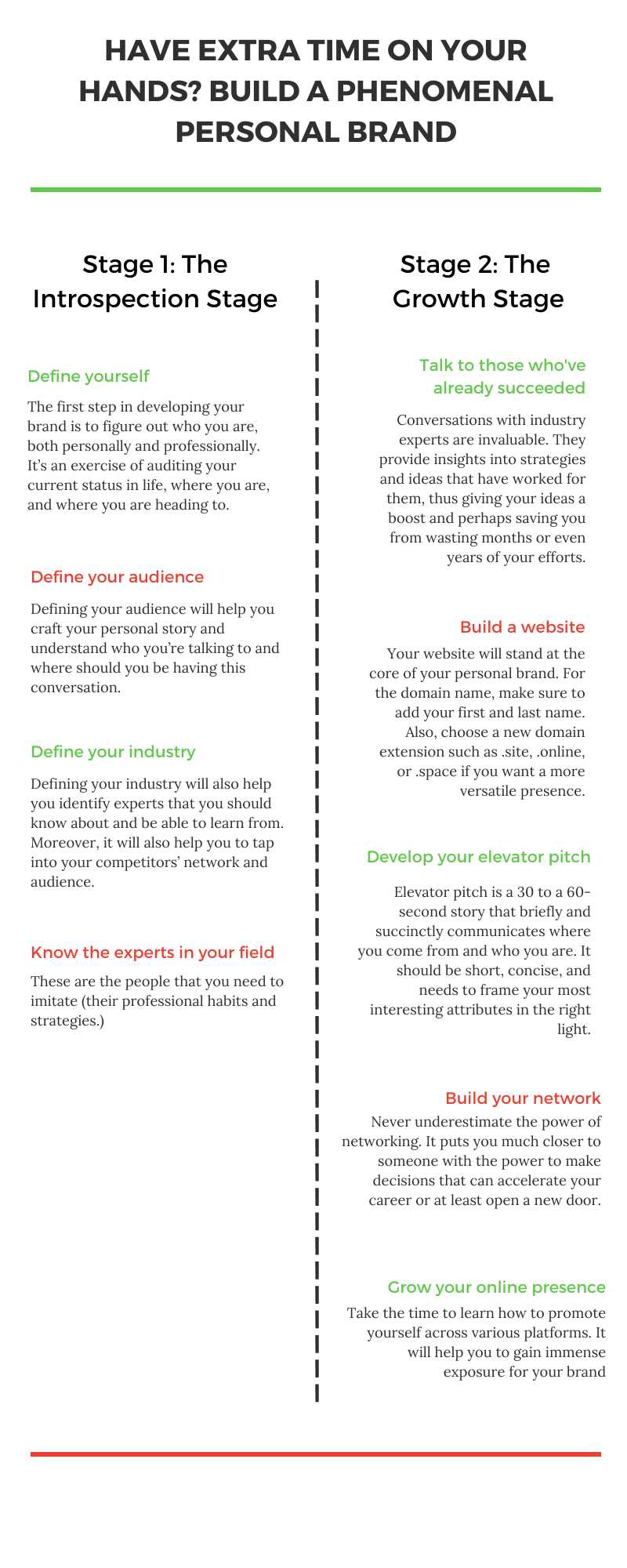
By Alisha Shibli
Building a strong professional reputation is crucial if you want to succeed, especially today when there are more candidates than open positions. A strong personal brand not only highlights your professional identity and authority but also opens you up to lucrative opportunities.
If you haven’t paid much attention to this yet, now is the right time to do so. As the world grapples with the pandemic in a state of lockdown, it’s an opportunity for you to shift your focus inside, instead of letting the fear and panic of the outside world get the better of you.
This article takes a look at personal branding tips that can help you build a reputation and communicate your unique attributes to everyone around you, including those in your industry. The process of building a personal brand is divided into two stages.
Stage 1: The introspection stage
Before you begin, analyze where you stand and what you need to do to build a good personal brand. Follow these steps to get a good understanding.
1. Define yourself
The first step in developing your brand is to figure out who you are, both personally and professionally. What motivates you? What are your strengths and weaknesses? Be as specific as possible. Basically, it’s an exercise of auditing your current status in life, where you are, and where you are heading to.
Your personal brand should provide a roadmap for where you want to go in the next 5 to 10 years. What do you want to be known for? Answering this question requires introspection and the ability to assess yourself fully and honestly.
2. Define your audience
Who are you trying to reach? Defining your audience will help you craft your personal story and understand who you’re talking to and where should you be having this conversation. It’s important to keep in mind that every audience is different, and will thus require an approach tailored to maximize interest within that specific group.
3. Define your industry
One of the key purposes of building your personal brand is to help you stand out among the competition. Defining your industry will also help you identify experts that you should know about and be able to learn from. Moreover, it will also help you to tap into your competitors’ network and audience.
4. Know the experts in your field
What is the value of identifying experts in your field? These are the people that you need to imitate (their professional habits and strategies.) This will save vast amounts of time and energy. After all, there’s no reason to reinvent the wheel. Keep in mind that modeling someone who’s come before you is an incredibly valuable tool.
If you can find a mentor, that’s the best thing you can do to build your personal brand. For example, most of the budding marketing entrepreneurs follow the footsteps of Gary Vaynerchuk, a successful entrepreneur, and a digital marketing expert.
Stage 2: The growth stage
Once you have all your preliminary research in place, the next step is to carve a plan and start executing it. One step at a time and you’ll soon be a brand of yourself. Here are a few ways you can do that.
1. Talk to those who’ve already succeeded
Once you’ve identified leaders and experts in your field, attempt to make contact and arrange to meet as many as possible. Conversations with industry experts are invaluable.
They provide insights into strategies and ideas that have worked for them, thus giving your ideas a boost and perhaps saving you from wasting months or even years of your efforts.
Don’t be hesitant to reach out to leaders in your industry, but also don’t expect to be immediately granted access to them. Many of these successful individuals actually enjoy telling their stories and offering career advice, but it might take time and persistence before you’re finally allowed into the room.
Persistence is the key, and this demonstration of persistence will often be recognized as a favorable characteristic because it shows that you aren’t a quitter.
2. Build a website
Your website will stand at the core of your personal brand. It’s where you’ll tell your story and highlight your accomplishments. Make sure you share a professional headshot and a branded email address to allow users to get in touch with you.
For the domain name, make sure to add your first and last name. Also, choose a new domain extension such as .site or .online if you want a more versatile presence. However, if you want to highlight your specialty in a specific niche then you could go with .tech (technology), .space (creative), or .press (media).
P.S. – some of these domain names are currently available for less than $2.
3. Develop your elevator pitch
Everyone needs a strong elevator pitch. This is a 30- to 60-second story that briefly and succinctly communicates where you come from and who you are. It is a crucial aspect of your personal brand and should be short, concise, and needs to frame your most interesting attributes in the right light.
Use the elevator pitch anywhere – at a cocktail party, an industry networking event, or when being introduced at a meeting of influential executives.
Make sure to keep your pitch as brief as possible by focusing on key points that you want to emphasize. For example, you could include the fact that you have strengths in a specific niche, have made significant contributions to your department at your company, or that you’re currently looking for a new position.
A strong elevator pitch will grab attention, provoke interest, and potentially open windows into more significant opportunities.
4. Build your contacts and network
Building your list of contacts is a critical aspect of developing your personal brand. Every contact comes from networking in one form or another, so never take for granted the power of introducing your contacts to one another. After all, serving as a connector between two people is as important as being connected to someone new.
Never underestimate the power of networking. Every relationship you have, whether personal or professional, creates a downstream effect. It means that any given connection puts you much closer to someone with the power to make decisions that can accelerate your career or at least open a new door.
The key is to make a habit of attending networking events even if they aren’t directly related to your field of expertise.
5. Grow your online presence
When it comes to branding, don’t overlook the power of the internet and social media. These tools provide an incredible reach that was never possible before. Take the time to learn how to promote yourself across various platforms. It will help you to gain immense exposure for your brand within a few months that, otherwise, would have required decades in the past.
In conclusion
Creating a personal brand isn’t easy and won’t happen overnight. These tips will help you think and get started in the right direction. Whether you want to progress as an individual or a corporation, a personal brand will prove beneficial in both cases. Without much ado, you should start preparing the blueprint because, right now, you can devote ample time for your personal growth.

Alisha is a Content Marketing Specialist at Radix, the registry behind some of the most successful new domain extensions, including .STORE and .TECH. You can connect with her on LinkedIn.